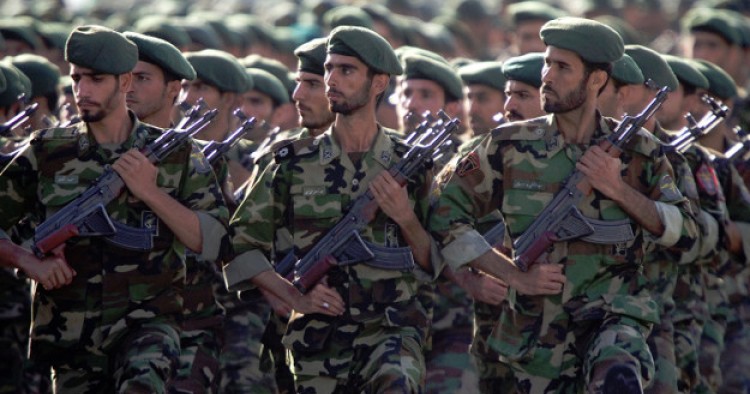The head of Khatam al-Anbia Construction Base, the main engineering and construction arm of the Islamic Revolution Guards Corps (I.R.G.C.), has said that the conglomerate is ready to play a leading role in Syria’s reconstruction process, Tasnim News Agency reported. “In line with the government’s policy, the Khatam Base, as a leading conglomerate for Syria’s rebuilding, is ready to do this work,” Brigadier General Ebadollah Abdollahi said at a press conference on the occasion of the 28th anniversary of the organization’s establishment. He also briefed reporters about the organization’s current projects inside Iran, such as construction of railroads, oil refineries, factories, power plants, fiber optics networks, naval assets, and housing schemes. He also revealed that the government has awarded agricultural projects to the company. Abdollahi further claimed that the government owes Khatam al-Anbia about $10 billion. He further stressed that relying on his organization is an effective way for the government to mitigate the impact of foreign sanctions.
Comment: As Abdollahi’s remarks indicate, the I.R.G.C. will be the main beneficiary of Iran’s role in Syria’s reconstruction process. Two weeks ago, I.R.G.C. Chief Commander Major General Mohammad Ali Jafari revealed that the Guards, rather than the Iranian private sector or other state-run companies, will spearhead Syria’s reconstruction efforts, Tasnim News Agency reported. “Based on meetings held in the government, it was decided that this mission [participation in Syria’s rebuilding] should be assigned to Sepah [I.R.G.C.] because of the security situation in Syria,” Jafari said at a gathering in Tehran. “Of course it is up to the Syrian government to decide to what extent Iran should participate in in the reconstruction [of Syria]. But the initial work for this mission is underway,” the I.R.G.C. commander added.
Tehran has recently stepped up efforts to play a major role in Syria’s rebuilding and become the Arab country’s leading trade partner. In September, the Iranian government signed several agreements with Damascus to restore Syria’s power grid and infrastructure. Iran and Venezuela are also set to start constructing an oil refinery in Syria by this year’s end, according to a senior official of Iran’s Research Center of Petroleum Industry (R.I.P.I.). And the main beneficiary of growing Iranian role in Syria’s economy appears to be the Islamic Revolution Guards Corps.
Since the seizure of the northern Syrian city of Aleppo last December, the Syrian government has granted I.R.G.C. companies lucrative contracts on a no-bidding basis. When Syrian Prime Minister Imad Khamis visited Tehran in January, for example, the Iranian government signed several agreements with the Syrian delegation. One major contract to build a mobile phone network in Syria was awarded to the I.R.G.C.-affiliated Mobile Telecommunication Company of Iran – delivering Iran’s elite military force an additional source of revenue. As in Lebanon, the I.R.G.C. is complementing its hard power mission with economic projects and other soft power strategies to consolidate its long-term presence and influence in Syria.
The latest comments by Jafari and Abdollahi are also the latest indication that the Rouhani government, contrary to President Hassan Rouhani's campaign promises, is unserious about reining in the I.R.G.C. economically.
Khatam al-Anbia is not only the largest I.R.G.C.-owned construction and engineering firm but the conglomerate also has significant political and economic power in Iran and funds I.R.G.C.’s operations abroad. The organization and its front companies also implement projects in regional countries, particularly in conflict zones such as Syria and Iraq. Khatam al-Anbia, and other I.R.G.C.-affiliated companies, benefited greatly from the privatization program of former President Mahmoud Ahmadinejad. In 2006, the company secured deals worth at least $7 billion in the oil, gas, transportation and other sectors. In October 2007, the U.S. Department of Treasury designated Khatam al-Anbia and several other I.R.G.C. companies under E.O. 13382 as part of a plan to counter Iran’s bid for nuclear capabilities and support for terrorism. And in February, 2010, the Treasury took further steps against Khatam al-Anbia by designating the company’s then commander, General Rostam Ghassemi, and its subsidiary companies. As the Treasury noted, the I.R.G.C. uses profits from Khatam al-Anbia for its illicit activities, including nuclear proliferation and support for terrorism in the region.
According to Abdollahi, the conglomerate has designed and implemented 2,500 projects at provincial and national levels in Iran since its creation, and currently works with 5,000 implementing partners from the private sector. The I.R.G.C. officials also revealed that a total of 170,000 people currently work on the organization’s projects. He added that his organization has recruited 3,700 graduates from Iran’s leading universities over the past 30 months.
In the past decade, the I.R.G.C. has turned into Iran's most significant economic powerhouse and dominates the country’s key sectors such as energy, construction, telecommunication, media, mining, electronics, automobile, banking, and shipping, among others. While I.R.G.C. leaders claim their involvement in the economic sector benefits the Iranian people and economy, in reality the I.R.G.C spends most of the revenues on military expenditures at home and abroad.
The Middle East Institute (MEI) is an independent, non-partisan, non-for-profit, educational organization. It does not engage in advocacy and its scholars’ opinions are their own. MEI welcomes financial donations, but retains sole editorial control over its work and its publications reflect only the authors’ views. For a listing of MEI donors, please click here.












